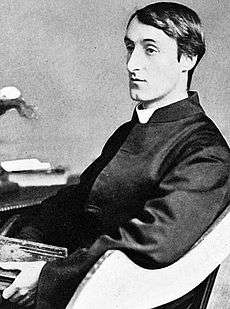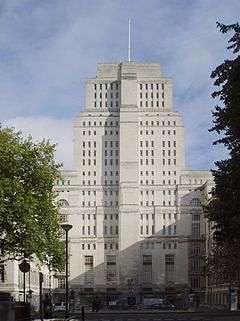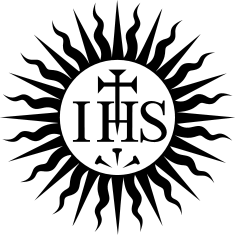Heythrop College, University of London
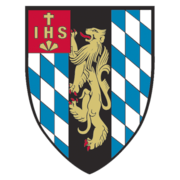 | ||||||||||
| Motto | Nil Sine Fide (Latin) | |||||||||
|---|---|---|---|---|---|---|---|---|---|---|
Motto in English | Nothing Without Faith | |||||||||
| Type | Public | |||||||||
| Established |
1614 in Louvain, Belgium 1971 constituent college of the University of London | |||||||||
| Chancellor | The Princess Royal (University of London) | |||||||||
| Principal | Michael Holman | |||||||||
| Students | 700 (2014/15)[1] | |||||||||
| Undergraduates | 350 (2014/15)[1] | |||||||||
| Postgraduates | 355 (2014/15)[1] | |||||||||
| Location | Kensington, London, England | |||||||||
| Campus | Urban | |||||||||
| Colours |
| |||||||||
| Affiliations |
Cathedrals Group University of London Universities UK IFCU | |||||||||
| Website |
www | |||||||||
 | ||||||||||
Heythrop College, University of London, is a public university and the specialist philosophy and theology college of the University of London located in Kensington in London and is the oldest constituent college of the federal University of London, being founded in 1614 by the Society of Jesus. Heythrop joined the University of London in 1971, maintaining its Catholic links and ethos whilst offering an educational experience that respects all faiths and perspectives.[2] Heythrop is a centre for inter-religious dialogue and modern philosophical inquiry and is a member of the Cathedrals Group of British colleges and universities.
Heythrop is situated on Kensington Square in London, whilst also having access to University of London facilities, such as Senate House and its extensive library. The college has three main departments offering undergraduate and postgraduate degrees in philosophy, theology and related social sciences as well as five specialist institutes and centres that promote and research in their specific field.
Heythrop has a total student population of 700, allowing one-to-one tutorship with its academic staff, one of the few institutions outside of Oxford or Cambridge to do so in the United Kingdom. The college is also widely regarded as being home to one of the largest philosophy and theology related libraries in Britain.[3] The college is a registered charity under English law.[4]
In June 2015 the Governing Body concluded that the College in its current form, as a constituent college of the University of London, will come to an end in 2018.[5]
History
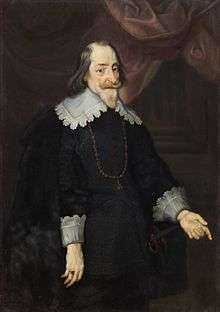
The College was founded in 1614 by the Society of Jesus in Leuven, Belgium, before moving in 1624 to Liège. Whilst in Liège, the college received patronage from Maximilian I, Elector of Bavaria, and the Elector's crest was adopted as the blue and white of the college Coat of Arms. During the French Revolutionary Wars, the college moved to Great Britain with philosophy being taught at Stonyhurst College in Lancashire and theology in St Beuno's College in Denbighshire. Being over 400 years old, Heythrop is one of the oldest universities in England,[6] although its origins lie outside England itself.
The University of London's charter of foundation, written in 1836, enabled it to grant degrees not only to students of the two existing colleges, University College and King’s College, but to students of other colleges around the country who had reached the required standard. Stonyhurst applied for recognition as an institution preparing for London degrees, and this right was granted it in 1840, allowing both lay and clerical students to prepare for London University degrees: the lay students were called "Philosophers", as had been the students at Liège back in the 1620s. In 1926, the colleges came together in Heythrop Hall, Oxfordshire. At the time of moving to Heythrop, the college was awarding degrees from the Jesuit Pontifical Gregorian University in Rome. However, the college sought integration with the British educational system and moved to London in 1970, officially becoming a specialist college of the University of London in 1971, and began to award University of London degrees. Upon moving to London, the College retained the name of its previous home, and has continued to be called 'Heythrop College'. The College moved to its current Kensington Square site in 1993.[7]
In January 2014, the College received decrees from the Congregation for Catholic Education of the Holy See, therefore officially reactivating its ecclesiastical faculties under the patronage of Robert Bellarmine. The ecclesiastical faculties is today grouped together as the Bellarmine Institute. In June 2014, Heythrop College celebrated the 400th anniversary of its foundation. While the college still retains its original function as a centre for the education of future priests and ministers of the Catholic Church, its student body is now much larger, more international and more diverse.[2]
In December 2014, Heythrop College announced that it would stop recruiting undergraduates for University of London degrees, noting its current discussions for a strategic partnership with St Mary's University, Twickenham. This move is due to financial difficulties the College faces as an autonomous College of the University of London.[8]
Campus

Heythrop College is located on Kensington Square, near Kensington High Street. The premises were previously in use by the Roman Catholic Religious of the Assumption, a religious order of sisters founded by Saint Marie-Eugénie de Jésus. A number of the sisters continue to live on the current site, and the Marie Eugénie Chapel is available for student use, where a College Mass is celebrated weekly, with the College choir. A chaplaincy is provided for all students, in addition to the University of London chaplaincy, as well as an Islamic prayer room.
Unlike many University of London colleges, which are divided among many campuses, the Kensington campus houses all Heythrop College facilities. Its library houses one of the largest philosophical and theological collections in the United Kingdom. All lecture halls are located in the Kensington campus, giving students the ability to communicate with academics more easily. On this site the Alban Hall of Residence is also located, the college's sole residence for its selective student population, as well as the students union, and fully catered student dining hall.
Through Heythrop's affiliation with the Jesuits it also serves as the London centre for a Jesuit University in the United States, Fordham University. Meeting facilities on the premises are often used by external groups: one such meeting in 2012 led to the formation of A Call To Action (ACTA, British Catholic Association).
Library
The College library houses some 180,000 volumes, which constitutes one of the largest Theology and Philosophy libraries in the United Kingdom. Its collections dates back to the founding of the College in 1614. The collections are currently housed in two buildings. The Theology, social sciences and literature collections are held in the Copleston Wing of the College while Philosophy collections are held in the Maria Assumpta library in its main building. Heythrop also hold many of its more precious volumes outside in the College repository in Egham. It has a large and important collection of pre-1801 books, such as Edward Baddeley's collections and a first edition of Isaac Newton's Opticks. The College library is owned by the Society of Jesus in Britain.[9]
Students at Heythrop College are also able to access the Senate House Library, and the libraries of the other colleges of the University of London due to the college's membership and specialist status. Through the University of London, Heythrop is also able to offer access to a wide range of digital journals and learning resources, such as JSTOR, giving its students a variety of material to access.
Academic profile
Heythrop has 700 students who prepare for a range of specialist undergraduate, graduate and research degrees. The college has five specialist institutes and centres which promote research, conferences and a variety of educational outreach activities. These are the 'Centre for Christianity and Inter-religious Dialogue', the 'Centre for Eastern Christianity', the 'Centre for Philosophy of Religion', the 'Religious Life Institute' and the 'Heythrop Institute for Religion and Society'. All of these institutes conduct research in their own field with the academic staff based at Heythrop College.
It offers both full-time, and part-time courses. Teaching consists of a combination of lectures, seminars and tutorials. Significantly, Heythrop College, Oxford University and Cambridge University make up the only three universities in the United Kingdom to offer one-to-one tutorials after every assignment.[10][11] This high level of tutelage makes the college noted for excellence in research and a high proportion of undergraduate students go on to study at a postgraduate level.
The College has a growing research profile in more recent years. It participated in the most recent Research Excellence Framework (2014) and gained considerable recognition for its research. The combined results for all elements of the REF places Heythrop at 16th in the overall ranking for the Theology & Religious Studies unit of assessment. Overall, 22% of its research outputs was deemed world-leading and a further 40% was deemed internationally-excellent. The research works recognised in its submission reflects efforts in both its Theology and Philosophy departments.[12]
Department of Philosophy
The Philosophy Department offers a variety of specialist philosophy degrees, either as single honours or as joint honours with theology, ethics or religious studies. The College has a thriving postgraduate research community, with students often attached to one of the many Institutes or Centres at the College. Students are free to choose from a wide range of modules, embracing both the continental and analytic traditions, as well as the history of philosophy. The department has also recently attempted to expand its programme with the introduction of a 'Politics' module into a small amount of its undergraduate degrees.
Department of Theology
The Theology Department offers a wide range of degrees. In addition to theology, religious studies and ethics, Heythrop is the first college in the world to offer undergraduate and postgraduate degree courses specifically focused upon the Abrahamic Religions, a course led by members of each of the three Abrahamic faiths.[13] The Theology department also offers a Divinity programme to candidates for the Catholic priesthood, making it a centre of Roman Catholic training and learning in the United Kingdom and students not following a vocation are encouraged to take one of the broader theology courses.[14]
Department of Pastoral and Social Studies
The college has a unique history and range of teaching in pastoral theology and allied disciplines, with a strong profile both in the United Kingdom and internationally. The Pastoral and Social Studies Department currently offers degree programmes in the following fields: Pastoral Theology and Practical Theology, including Sociology of Religion; Christian Spirituality; Ethics; Liturgy; Canon Law; and Psychology, including a unique specialism in the Psychology of Religion.[15]
Bellarmine Institute
The Bellarmine Institute is the ecclesiastical faculties of the College. It is named after St. Robert Bellarmine, a Cardinal and Doctor of the Catholic Church to whom Heythrop has been dedicated to since 1926. The Faculties were first established in 1964, when the College was located in the Oxfordshire countryside when it became a 'Pontifical Athenaeum'. However, since moving to London and established as a constituent college of the University of London the Faculties became dormant. The Faculties were re-activated on 17 September 2013 by a decree of the Congregation for Catholic Education from the Holy See. Thus, expanding the opportunities and teaching the College could offer to seminarians, priestly candidates than before.[16]
The Institute offers degree programmes in Theology and Philosophy intended for ordination to the Catholic priesthood, those already engaged in church ministry and other scholastics, and other scholastics. The ecclesiastical degree programmes offered covers all three cycles for priestly formation in the Catholic Church:
|
|
Public lectures
The College hosts a number of free public lectures, research seminars and study days throughout the year on a variety of philosophical & theological topics. Concurrently, throughout the year, Heythrop runs a number of paid events that are open to the general public.
Heythrop College currently runs the Loschert Lecture, a lecture series delivered by eminent philosophers, theologians and people of faith. The series is intended to reflect from a consciously Christian perspective, on significant social, political and ethical issues in society. The series is named after William Loschert, Chairman of the Trustees of the London Centre of Fordham University who donated the funding for the Loschert Lectures. Previous speakers includes Charles Margrave Taylor, Baroness Patricia Scotland, Peter Sutherland KCMG, Lord Daniel Brennan.
The Heythrop Journal
Heythrop College sponsors The Heythrop Journal, the international philosophy and theology academic journal. Published on a bimonthly basis, The Heythrop Journal was founded in 1960 by Bruno Brinkman as a format for research on the relational dialogue between philosophy and theology. Still retaining this original function, the current editor is Patrick Madigan, a faculty member of Heythrop College.
Student life
Students' Union
The Union is managed by a team of eleven officers, elected annually. Officers have individual responsibilities, including student welfare, entertainments, societies, communications, development, campaigns and mature students. The team is headed by the sabbatical President and the sabbatical Vice-President, students who have either completed their studies or have taken a year out in order to fill this full-time position and help provide and foster the close-knit society that exists at Heythop College.
The Lion newspaper
Heythrop's student newspaper, The Lion, was established in 2010 to provide Heythrop students with an independent source of information about the college as well as providing a platform for discussion and debate. The Lion is operated by eight students editors, including two Senior Editors and an Editor-in-Chief. The Lion is a founding newspaper of the London Student Journalism Support Network, which won the NUS "Best Student Media" Award in 2011. In 2015, the Lion ceased future publications of future newspapers. From September 2015, the Lion will continue to be published in the form of magazines instead of newspapers.
Accommodation
Heythrop has its own on-site hall of residence but, due to the college's relatively small size in comparison to other constituent colleges of London University, the Alban Hall is also relatively small housing only ninety-six students. Housing is also available through the University of London Intercollegiate Halls, and the University of London housing service and most first year students choose to remain in or around Heythrop's Kensington Campus.
Notable people
Notable alumni
.jpg)
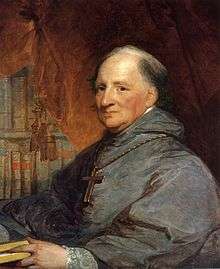
- Polycarpus Augin (Eugene) Aydin (born 1971), Metropolitan and Patriarchal Vicar for the Archdiocese of the Netherlands of the Syriac Orthodox Church
- William Bentinck, Viscount Woodstock (born 1984), writer, social entrepreneur and heir to the Earldom of Portland
- Brendan Callaghan (born 1948), Jesuit priest and psychologist
- Gerald O'Collins, Jesuit priest, author, academic, and educator
- Frederick Copleston[2] (1907–1994), Jesuit priest, philosopher and historian
- Ralph Coverdale (1918–1975), soldier, behavioural psychologist, management consultant and trainer
- Bernt Ivar Eidsvig (born 1953), Roman Catholic Bishop of Oslo
- Dame Sarah Mullaly, Anglican Bishop of Crediton (since 2015)
- Mark Elvins (1939–2014), Warden of Greyfriars, Oxford
- Michael Charles Evans (1951–2011), Roman Catholic Bishop of East Anglia
- Aloysius Cortie (1859–1925), Jesuit priest and astronomer
- Alan Williams, current Bishop of Brentwood
- Robert Hannigan (born 1965), Director of GCHQ (2014–present)
- Gerard Manley Hopkins (1844–1899), Jesuit priest, poet and professor
- Joseph Rickaby (1845–1932), Jesuit priest and philosopher
- James Brodrick (1891–1973), Jesuit priest and historian
- Matt Malone, Jesuit priest and current editor-in-chief of America Magazine[17]
- Gerard J. Hughes, Jesuit priest and theologian; former master of Campion Hall, Oxford (2006–13)
- Richard Clarke (1839–1900), Jesuit priest and theologian. First Master of Campion Hall, Oxford
- Gerard W. Hughes (1924–2014), Jesuit priest, spiritual guide and author of God of Surprises[18]
- Clarence Gallagher, Jesuit priest and theologian. Former Dean of the Faculty of Canon Law and Rector of the Pontifical Oriental Institute (1990–1995).[19]
- Joseph A. Munitiz, Jesuit priest, theologian and librarian. Former editor of the Heythrop Journal and master of Campion Hall, Oxford.
- Peter Levi (1931–2000), failed Jesuit priest, poet, archaeologist, travel writer, biographer, critic and Professor of Poetry at the University of Oxford
- Bernard Lonergan (1904–1984), Jesuit priest, philosopher and theologian
- John Anthony McGuckin (born 1952), Orthodox Christian priest, academic and poet
- Peter Milward (born 1925), Jesuit priest and literary scholar
- Martin Newland (born 1961), journalist and editor of The National
- Malcolm Patrick McMahon (born 1949), Roman Catholic Bishop of Nottingham
- Michael Anthony Moxon (born 1942), Anglican Dean of Truro Cathedral
- James J. Quinn (1919–2010), Jesuit priest, theologian and hymnwriter
- John A. Saliba, Jesuit priest and professor of religious studies
- Frederick Turner (1911–2001), Jesuit priest, archivist, librarian and former headmaster at Stonyhurst College
- Lindsay Urwin (born 1956), Anglican Bishop of Horsham
- Dominic Walker (born 1948), Anglican Bishop of Reading, currently Bishop of Monmouth
- Nicholas King, Jesuit priest, visiting research fellow at Campion Hall, Oxford; current Chairman of the Catholic Biblical Association of Great Britain
- John Carroll (1735–1815) First Roman Catholic bishop and archbishop in the United States; founded Georgetown University
- Charles Carroll (1737–1832) Maryland delegate and one of the signers of the Declaration of Independence
- Charles Plowden (1743–1821), Jesuit priest, writer and administrator; first Rector at Stonyhurst
- Francis Plowden, Jesuit priest, barrister and writer. Taught at the College during the Suppression of the Society of Jesus
- Sylvester Joseph Hunter, Jesuit priest and educator
- Salvino Azzopardi (1931–2006), Jesuit priest and philosopher
- Philip Sheldrake, religious historian and theologian. Moulsdale Professorial fellow, University of Durham
- Paul Lakeland (1946– ), Professor and Chair of the centre for Catholic studies of Fairfield University
- Louis Caruana, Jesuit priest and philosopher. Dean of the faculty of Philosophy at the Pontifical Gregorian University
- Samuel E. Carter, former Archbishop of Jamaica (1919–2002)
- Edward Yarnold (1926–2002), former Master of Campion Hall, Oxford from 1965–72
- Stephen Perry (1833–1889), Jesuit priest and astronomer
Notable faculty and staff
- Elizabeth Burns, Lecturer in philosophy of religion
- Janet Soskice, taught philosophy of religion and ethics. Currently professor of Theology at Jesus College, Cambridge
- William Baldwin (1563–1632), former professor of moral theology at the College in Louvain. Notable Jesuit implicated in the Gunpowder Plot.
- Henry James Coleridge (1822–1893), former professor of Scriptures. First editor of The Month. Member of the Oxford Movement. Religious preacher and writer.
- Keith Ward, professorial research fellow. Former Regius Professor of Divinity at Oxford.
- Alan Carter, former head of the philosophy department
- Dan Cohn-Sherbok, visiting research fellow
- John Cottingham, professorial research fellow.
- Johannes Hoff, current professor of systematic theology
- Frederick Charles Copleston, taught as lecturer in philosophy
- Michael Holman, current Principal of Heythrop College
- Kevin T. Kelly, former lecturer in moral theology
- Gwen Griffith-Dickson, former Vice principal of Heythrop College. Founder of Lokahi Foundation. [20]
- Joanna Mcgrath, former lecturer in psychology of religion.[21]
- Stephen Law, Reader in philosophy
- Martyn Percy, professorial research fellow
- George Stack, former governor
- Peter Vardy, former Vice-Principal and senior lecturer in philosophy
- Miguel Vieira, former research assistant to the Dean of Research
- James Hanvey, Jesuit priest, theologian, Director of the Heythrop institute for Religion, Ethics and Public life. Currently Master of Campion Hall, Oxford.
- John Mahoney, Jesuit priest and theologian. Former F.D.Maurice Chair of Moral and Social Theology at King's College London. Former Principal of Heythrop College.
- Gemma Simmonds, senior lecturer in pastoral studies and theology. Current President of the Catholic Theological Association of Great Britain.
- Martin Ganeri, lecturer in theology and Director of the Centre for Christianity and Interreligious dialogue. Concurrently senior tutor and vice regent at Blackfriars Hall, Oxford.
- Maurice Bevenot (1897–1980), taught as lecturer in ecclesiology. Consultant to the Pontifical council for promoting Christian Unity.
- Michael Barnes, professor of theology. Dean of research students (theology). Consultant to the Pontifical Council for Interreligious Dialogue.
- Theodore Davey (1935–2013), taught canon law from 1965–2006.[22]
- Franz Xavier Wernz (1842–1914), professor of canon law in 1882 at St.Beuno's. Served as the 25th Superior General of the Society of Jesus and Rector of the Pontifical Gregorian University, Rome.
- John Morris (1826–1893), taught canon law in 1867.
- George Tyrrell (1861–1909), taught philosophy at Stonyhurst and condemned for Modernism.
- Cuthbert Lattey (1877–1954), former Professor of Scriptures.
- Norman Russell, tutor in Early church history and lecturer in theology. Current Honorary research fellow at St Stephen's House, Oxford.
See also
- Third-oldest university in England debate
- List of the oldest schools in the world
- List of University of London people
Coordinates: 51°29′57.12″N 0°11′25.32″W / 51.4992000°N 0.1903667°W
References
- 1 2 3 "2014/15 Students by HE provider, level, mode and domicile" (XLSX). Higher Education Statistics Agency. Retrieved 19 January 2016.
- 1 2 3 "About us". Heythrop College.
- ↑ "University of London: Heythrop College". london.ac.uk.
- ↑ Charity Commission. Heythrop College, registered charity no. 312923.
- ↑ "Heythrop College to close after 400 years" Catholic Herald 26 June 2015
- ↑ College History.
- ↑ "Heythrop College history". Heythrop College.
- ↑ "Heythrop College partnership talks with St Mary's University update". Heythrop College.
- ↑ "Library and study resources". Heythrop College.
- ↑ "Letters: Don't give bigots a platform". The Independent.
- ↑ Heythrop College
- ↑ "REF reveals world-leading research at Heythrop College". Heythrop College.
- ↑ "Undergraduate Study". Heythrop College.
- ↑ "BD Bachelor of Divinity". Heythrop College.
- ↑ Heythrop College, .
- ↑ "Faculties". Heythrop College.
- ↑ "Matt Malone, SJ, Named New Editor in Chief of America". America Magazine.
- ↑ Peter Stanford. "Gerard W Hughes obituary". the Guardian.
- ↑ "Father Clarence Gallagher profile". Herald Scotland. Retrieved 3 December 2016.
- ↑ "Professor Gwen Griffith-Dickson".
- ↑ "Revd Dr Joanna Collicutt – Ripon College Cuddesdon".
- ↑ "Obituary Theodore Davey Cp – from the Tablet Archive".
External links
| Wikimedia Commons has media related to Heythrop College, University of London. |
